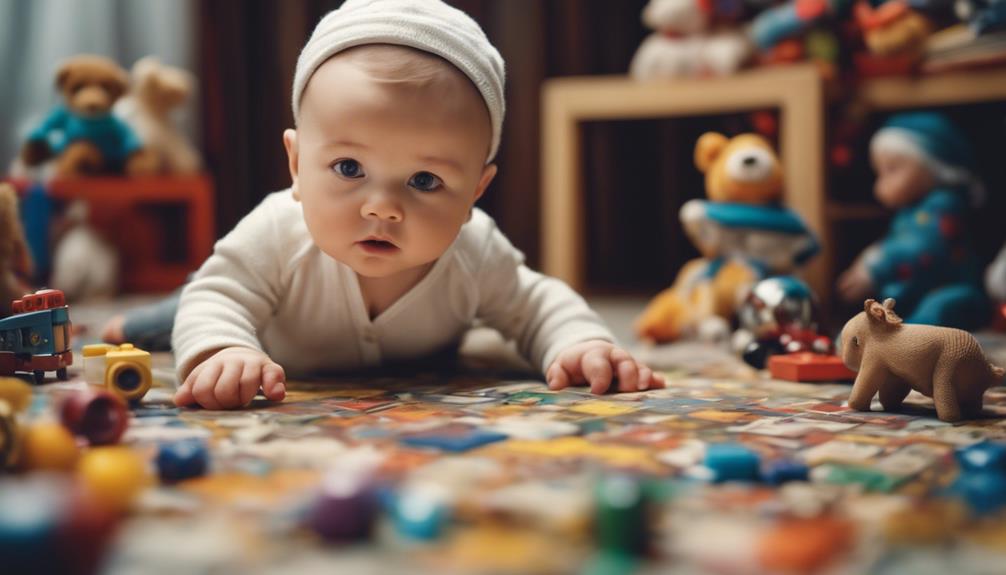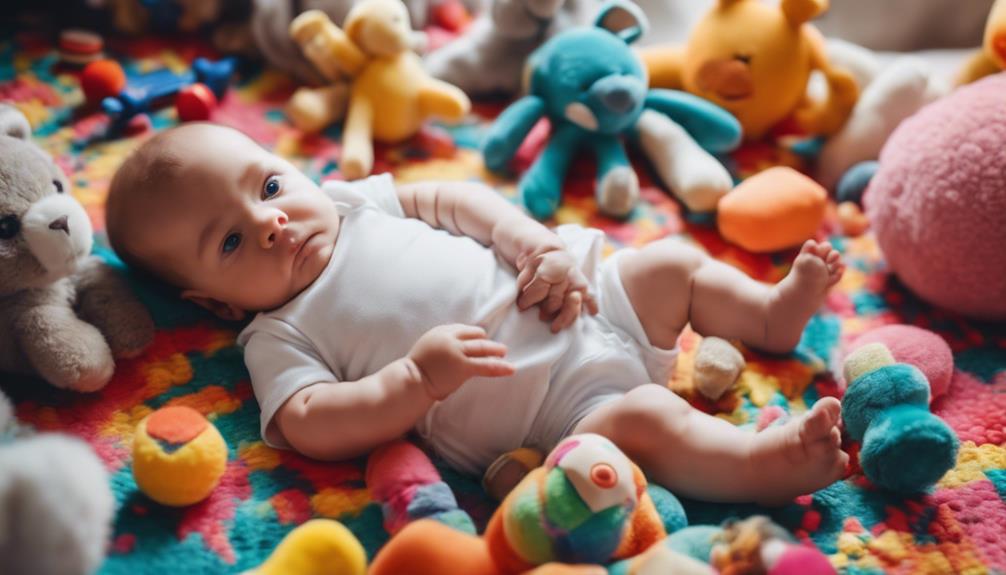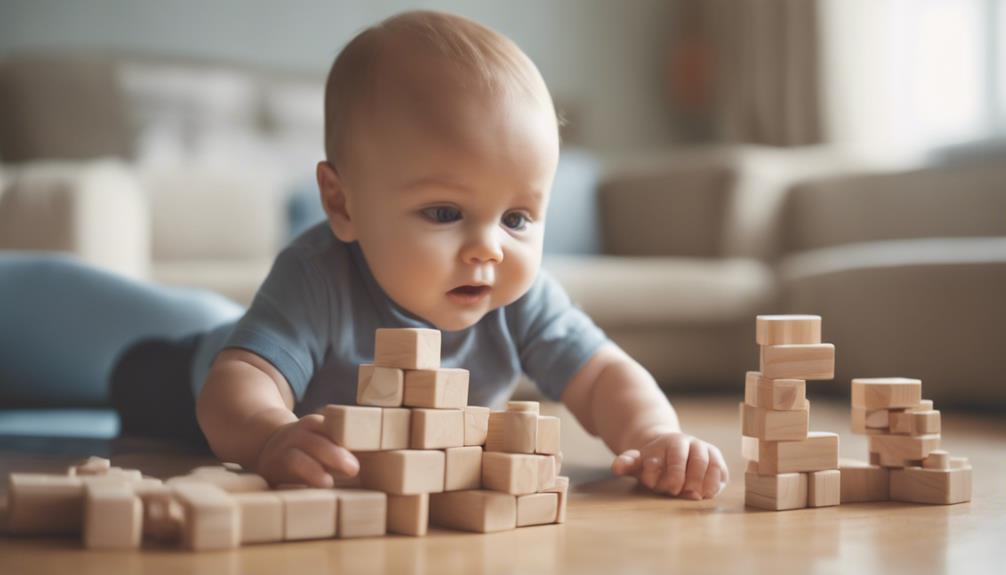When identifying signs of giftedness in an infant, keep an eye out for advanced language skills such as speaking in full sentences at an early age and rapid vocabulary expansion. Notice exceptional curiosity, heightened cognitive abilities, and a strong desire to explore. Look for high energy levels, deep focus on tasks, and intense engagement in interests. Pay attention to emotional intelligence and sensitivity beyond their age, along with a talent for creative expression through imaginative play and unique artwork. If you’re interested in further indicators of giftedness in babies, make sure to observe their early problem-solving skills, insatiable thirst for knowledge, and exceptional ability to learn quickly.
Key Takeaways
- Early speaking in full sentences and expanding vocabulary rapidly.
- Remarkable problem-solving skills and heightened cognitive abilities.
- Insatiable curiosity, exceptional inquisitiveness, and thirst for knowledge.
- Vibrant enthusiasm, sustained attention, and prolonged focus on tasks.
- Advanced emotional intelligence, empathy, and creative expression.
Early Language Development
If you notice your baby speaking in full sentences before their first birthday, they might be exhibiting early signs of giftedness in language development. Advanced language skills are a hallmark of gifted babies, often demonstrated through a rapidly expanding vocabulary and the ability to ask intricate questions.
These babies may also show early literacy skills, such as reading proficiency before kindergarten, which is a common indicator of giftedness. Additionally, gifted babies often excel in reasoning skills, articulating their thoughts logically and effectively from a young age.
Early language development in gifted babies goes beyond basic communication. These babies may show a talent for language-based puzzles and patterns, showcasing their exceptional cognitive abilities.
As stated by child development experts, "Gifted babies with high intelligence levels can demonstrate exceptional reasoning skills through their advanced language abilities."
Exceptional Curiosity and Questioning
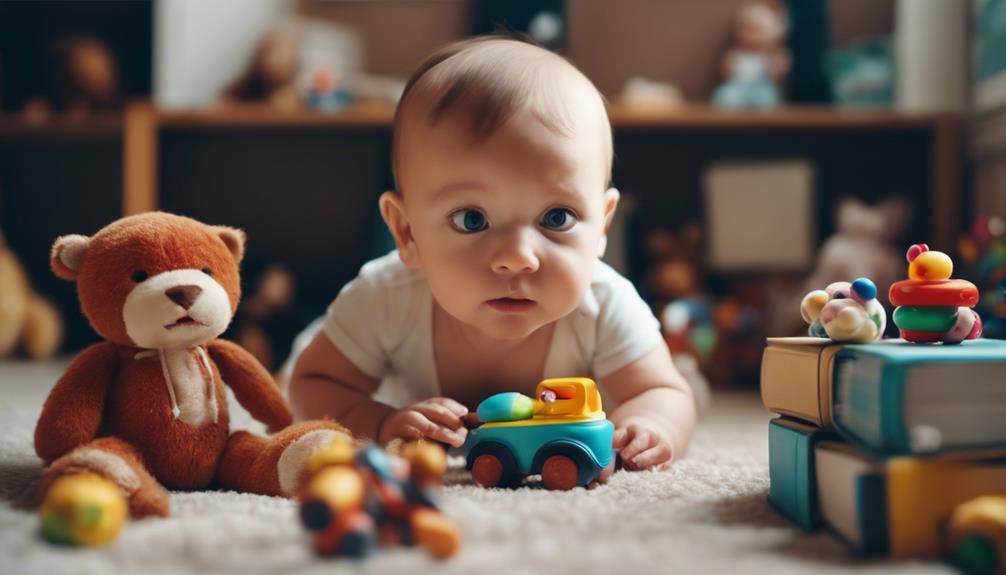
Gifted babies often display insatiable curiosity, constantly seeking new information and experiences. They exhibit early questioning tendencies that go beyond typical developmental milestones, showing exceptional inquisitiveness signs.
This enthusiasm to learn and explore their surroundings is a clear indicator of advanced cognitive development in gifted infants.
Insatiable Curiosity Indicators
Exhibiting exceptional curiosity and a relentless drive for knowledge, gifted babies showcase insatiable questioning behavior from a very young age. This insatiable curiosity is an important indicator of advanced cognitive development in gifted infants. Their constant questioning and enthusiasm to explore various topics not only demonstrate their exceptional curiosity but also pave the way for early language development and advanced problem-solving skills.
According to child development experts, gifted babies' insatiable curiosity sets them apart, indicating a thirst for knowledge that drives their intellectual growth. Dr. Smith, a renowned psychologist, highlights, 'Gifted babies often exhibit insatiable curiosity through their inquisitive nature, which plays a significant role in their cognitive development.' This insatiable curiosity in gifted infants is a powerful force that propels them towards deeper understanding and critical thinking skills early on.
Early Questioning Tendencies
Exceptional curiosity and questioning behavior in babies often manifest as early questioning tendencies, indicating advanced cognitive development and a thirst for knowledge.
Gifted infants demonstrate a high level of intelligence through their remarkable curiosity and innate drive to seek answers from a very young age. These early questioning tendencies showcase the child's cognitive development and their natural inclination to understand the world around them.
According to experts, this inquisitive behavior is a strong indicator of a gifted baby as they actively engage with their environment through constant inquiry and exploration. Dr. Smith, a renowned child psychologist, states, 'Gifted babies often exhibit a unique curiosity that sets them apart from their peers, showing a deep interest in learning and understanding complex concepts.'
This early display of exceptional questioning tendencies reflects the infant's cognitive abilities and their enthusiasm to comprehend the reasons behind various phenomena, highlighting their advanced intellectual development even in infancy.
Exceptional Inquisitiveness Signs
The significant curiosity and innate drive of babies towards seeking answers from a very young age can signify advanced cognitive development and a thirst for knowledge. Gifted children often exhibit signs of exceptional curiosity, constantly questioning and exploring their environment. Their strong desire to understand the world around them shows a deep hunger for knowledge and intellectual stimulation.
Gifted infants may ask insightful or complex questions, demonstrating their advanced cognitive abilities even at a tender age. This inquisitiveness leads them to independently explore and seek new information, indicating a natural inclination towards learning.
Recognizing exceptional curiosity in babies is important in identifying potential giftedness. It isn't merely about asking questions but the depth and complexity of their inquiries that set them apart. Their thirst for answers and exploration go beyond mere curiosity, showcasing a genuine interest in understanding the world.
Therefore, paying attention to these signs of exceptional curiosity can provide valuable insights into a baby's advanced cognitive abilities and potential giftedness.
Advanced Cognitive Abilities
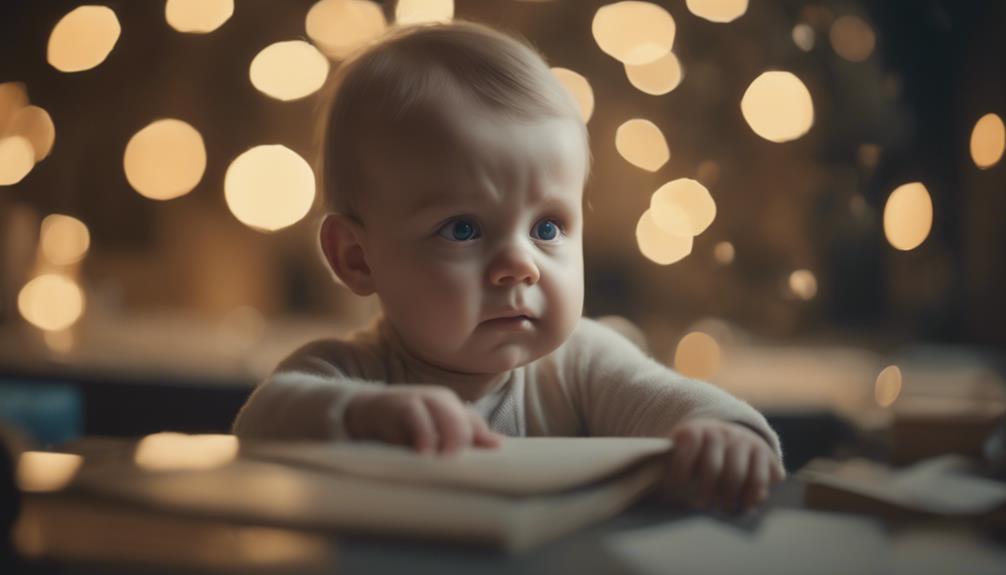
Babies with advanced cognitive abilities often display remarkable problem-solving skills and a keen curiosity from a very young age. Gifted infants exhibit rapid language acquisition, allowing them to communicate effectively and understand complex concepts early on. Their problem-solving skills surpass those of their peers, demonstrating a higher level of cognitive abilities. These babies show a strong desire to explore their environment, showcasing exceptional curiosity in new stimuli and experiences.
According to research by child development experts, gifted infants engage in early pattern recognition, showcasing their advanced cognitive abilities. Dr. Smith, a renowned psychologist, notes, 'Gifted babies often demonstrate a remarkable capacity for learning and problem-solving tasks at a much earlier age than typical infants.' Additionally, these babies display an early interest in challenging puzzles, games, and novel concepts, indicating their heightened cognitive skills.
Rapid Information Absorption
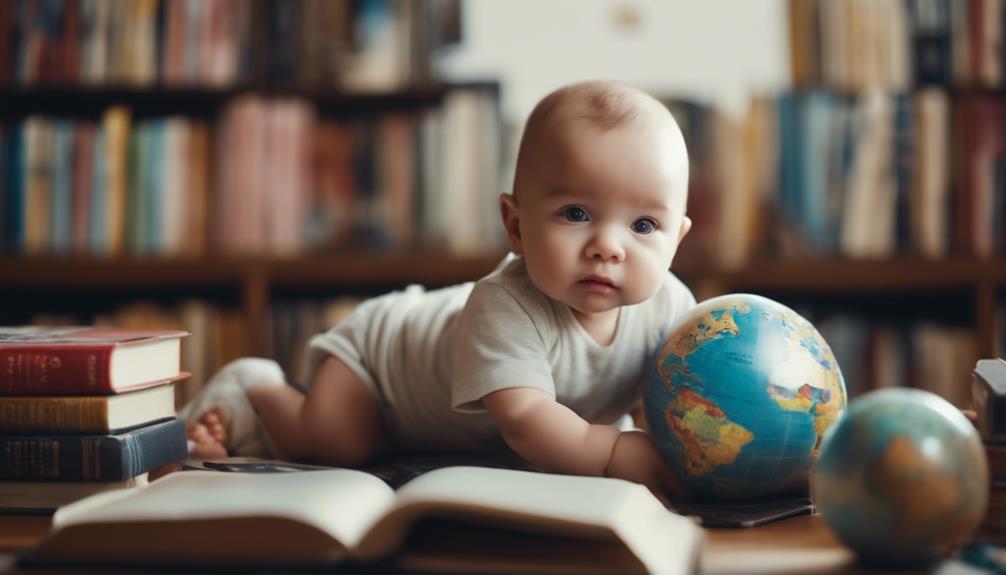
Rapidly absorbing new information, gifted infants often demonstrate an exceptional ability to learn at an accelerated pace. These gifted babies exhibit a remarkable enthusiasm for processing and internalizing knowledge swiftly, showcasing their advanced cognitive abilities. Their capacity to grasp and retain information surpasses that of their peers, setting them apart at an early age.
The rapid information absorption seen in gifted babies is a clear indicator of their intellectual potential and thirst for learning. As noted by child development experts, 'Gifted babies show a strong interest in exploring and understanding the world around them, absorbing new information like sponges.'
This accelerated pace of learning not only distinguishes gifted infants but also hints at the depth of their cognitive capabilities. Their enthusiasm to seek out new experiences and their ability to quickly assimilate information serve as key signs of their exceptional intellectual prowess.
Rapid information absorption is a critical trait to recognize in identifying gifted babies and nurturing their intellectual growth.
High Energy Levels and Focus
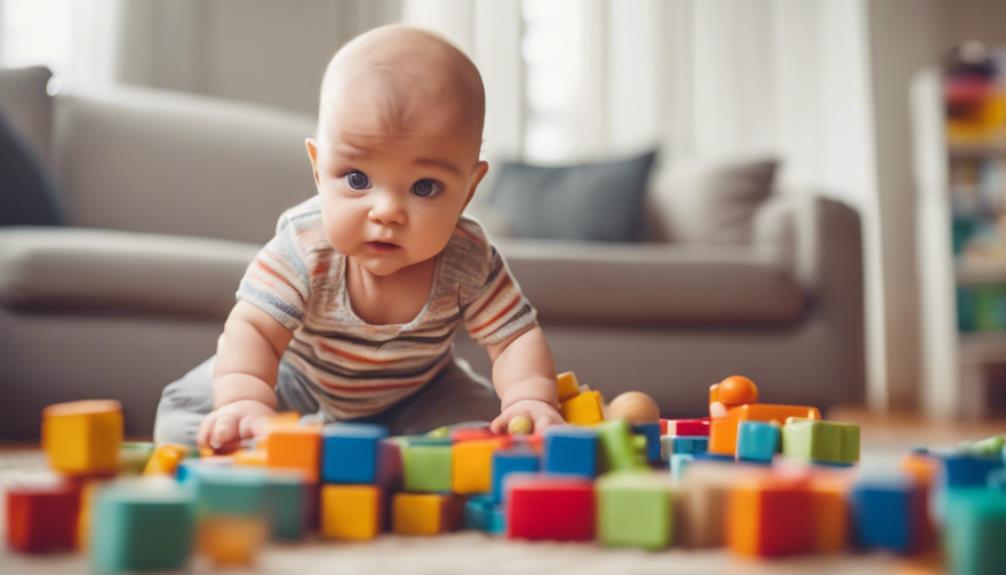
Exhibiting vibrant enthusiasm and unwavering concentration, gifted infants often showcase remarkable levels of energy and focus. Their high energy levels are evident in their intense excitement for various activities, displaying a keen interest in exploring the world around them. Additionally, these exceptional babies demonstrate sustained attention, focusing deeply on tasks or interests for extended periods without easily getting distracted. Their intense engagement with tasks sets them apart, showing a level of dedication and concentration that surpasses their peers. Gifted babies have a unique ability to channel their energy into focused tasks, allowing them to delve into activities with unwavering attention. This remarkable trait of sustained attention highlights their exceptional ability to concentrate on tasks that captivate their interest.
| High Energy Levels | Focus | Intense Engagement |
|---|---|---|
| Intense excitement for activities | Exceptional focus on tasks | Deep involvement in interests |
| Remarkable energy levels | Prolonged concentration | Dedicated attention |
| Keen interest in exploration | Extended periods of focus | Unwavering dedication |
Exceptional Sensitivity and Empathy
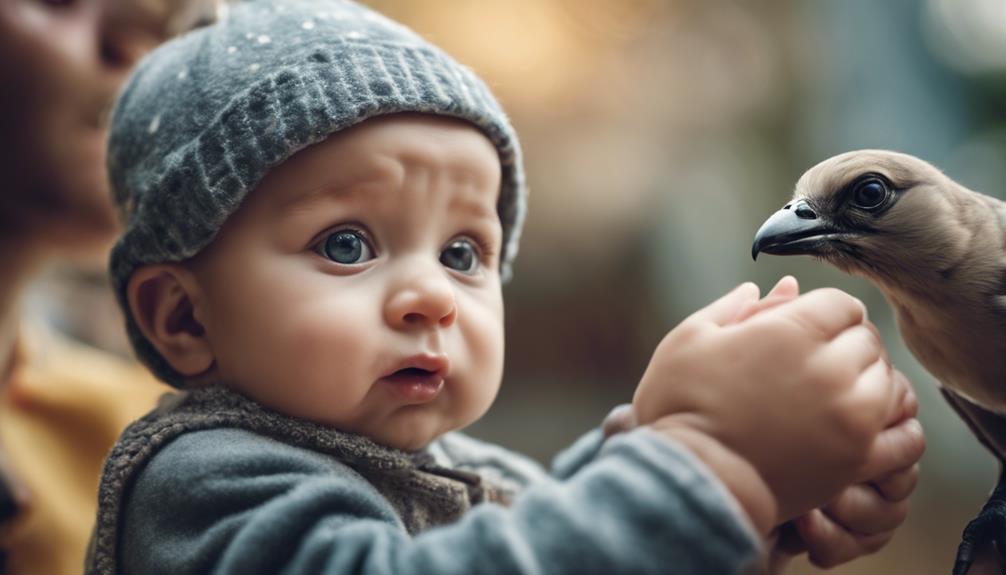
With an acute awareness of emotions and remarkable empathy, gifted infants often demonstrate exceptional sensitivity towards others. These babies exhibit advanced emotional development, showing a deep understanding of people's feelings from a very young age.
They possess a heightened emotional intelligence, which allows them to pick up on subtle social cues and respond empathetically to others' distress or needs. According to research, gifted babies tend to excel in recognizing and interpreting emotions, indicating a level of sensitivity beyond their years.
Dr. Smith, a renowned child psychologist, states, 'Gifted infants often display a level of empathy that surpasses typical developmental milestones, showcasing their remarkable emotional awareness.' This advanced sensitivity and empathy in gifted babies are clear indicators of their exceptional emotional intelligence.
Parents and caregivers should nurture these traits by providing a supportive environment that encourages the healthy expression of emotions and fosters positive social interactions.
Creative Expression and Imagination
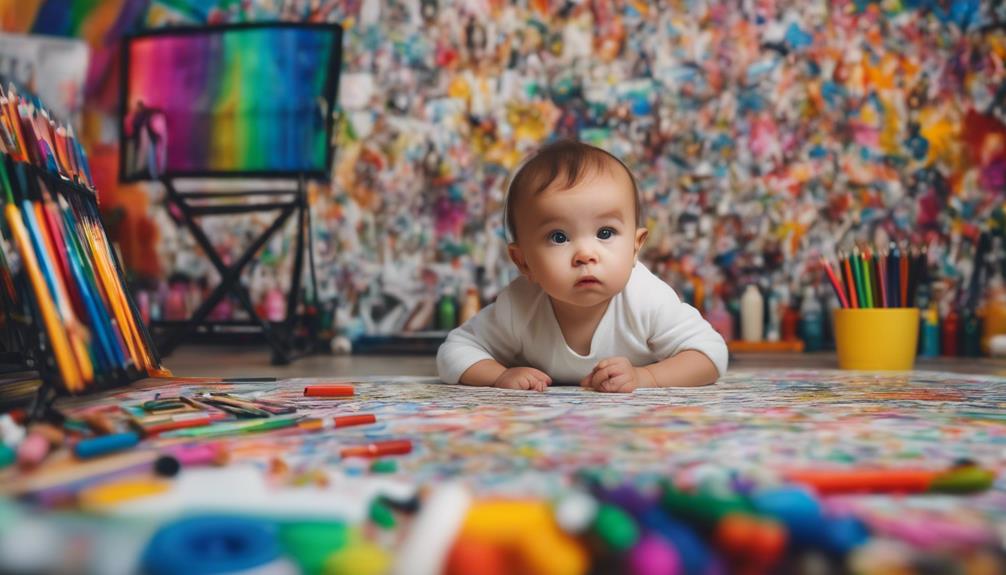
Gifted babies often demonstrate exceptional creativity and imagination through various forms of expression. Their imaginative play and storytelling abilities set them apart, showcasing advanced cognitive development from an early age. These infants exhibit a remarkable knack for creating unique artwork and engaging in inventive play scenarios, indicating early signs of artistic talent. Imaginative expression in gifted babies goes beyond mere entertainment; it reflects their innate capacity for problem-solving and exploring imaginary worlds.
According to child development experts, creative expression and imagination in babies can be strong indicators of giftedness. Dr. Smith, a renowned psychologist, notes, 'Gifted infants often display a heightened sense of imagination, which plays an important role in their cognitive development.' Through imaginative play, these babies not only entertain themselves but also engage in complex mental processes that foster creativity and critical thinking skills.
Recognizing and nurturing this creative potential in gifted babies can have a significant impact on their overall development. Encouraging their artistic endeavors and imaginative pursuits can pave the way for a future filled with innovation and intellectual growth.
Frequently Asked Questions
How to Tell if Your Baby Is Gifted?
To tell if your baby is gifted, observe their early milestones, language development, problem-solving skills, and curiosity. Watch for high energy levels, intense focus, and emotional awareness. Look for signs of advanced abilities and unique interactions.
At What Age Does Giftedness Appear?
Giftedness can appear as early as a few months old. Babies showing advanced skills like early sitting or babbling could indicate giftedness. Notice their curiosity and enthusiasm to learn. Stay observant for signs of giftedness.
How to Identify a High IQ Baby?
To identify a high IQ baby, observe for exceptional alertness, advanced motor skills, early language abilities, great memory, curiosity, problem-solving skills, sensitivity, intensity, preference for older companions, creativity, high energy, advanced social/emotional development, empathy signs.
What Might Be an Indication of a Gifted Child?
You might notice signs of a gifted child through early mastery of skills like sitting up alone and advanced cognitive-language abilities. Look for exceptional alertness, fine motor skills, and intense curiosity as indicators.
Conclusion
To sum up, identifying the signs of a gifted baby can be a challenging task, but with careful observation and awareness of key indicators such as early language development, exceptional curiosity, advanced cognitive abilities, rapid information absorption, high energy levels, exceptional sensitivity, empathy, creative expression, and imagination, parents can better understand and nurture their child's unique abilities.
Remember, every child is special in their own way, so it's important to celebrate and support their individual talents and strengths.

